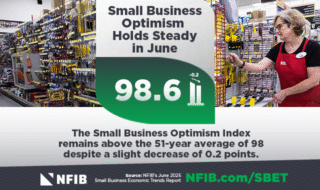Topics:
January 11, 2022
NFIB urges Court to issue a stay on the Biden Administration’s mandate for employers to require vaccination or weekly testing
At the U.S. Supreme Court, NFIB Opposes OSHA’s Vaccine Mandate for Businesses with 100 or more Employees
Get to know NFIB
NFIB is a member-driven organization advocating on behalf of small and independent businesses nationwide.
Related Articles

July 15, 2025
NFIB Expert Discusses Beneficial Ownership Information Reportin…
NFIB Vice President of Federal Government Regulations Jeff Brabant explains…
Read More


July 14, 2025
New NFIB Op-Ed: Small Businesses Need Credit Card Swipe Fee Ref…
In a new op-ed in Small Business Xchange, Andrea McGee, NFIB Principal of F…
Read More


July 14, 2025
Small Business Optimism Remains Steady but Still Above Average…
The NFIB Small Business Optimism Index declined by 0.2 of a point in June w…
Read More


July 14, 2025
Bill to Stop Shakedown ADA Lawsuits Fails to Advance
Legislature places fat cat lawyers above starving small business owners
Read More







